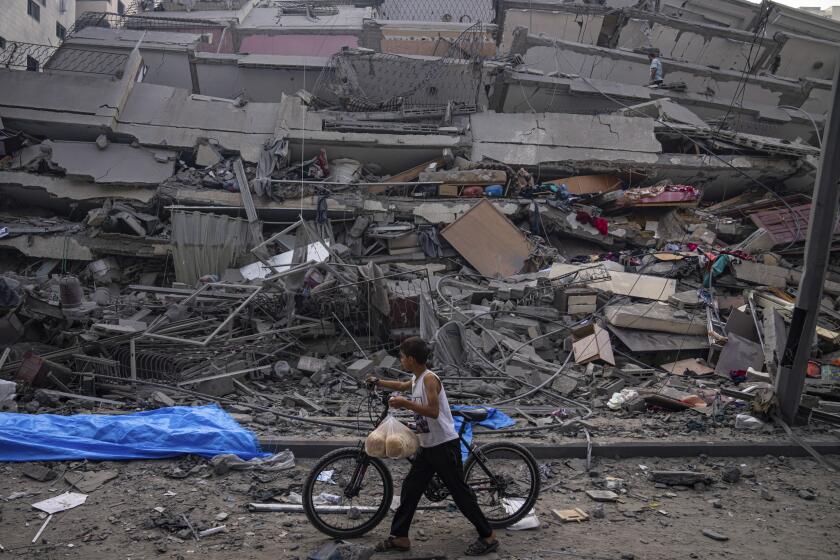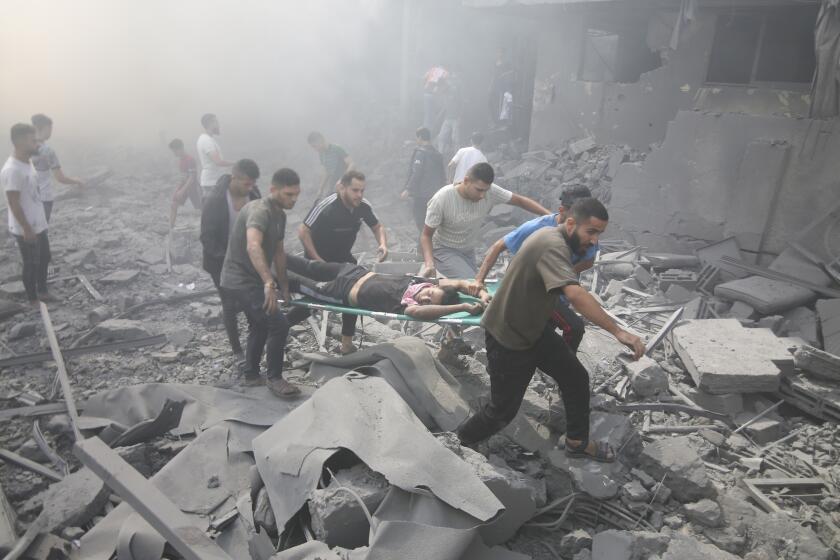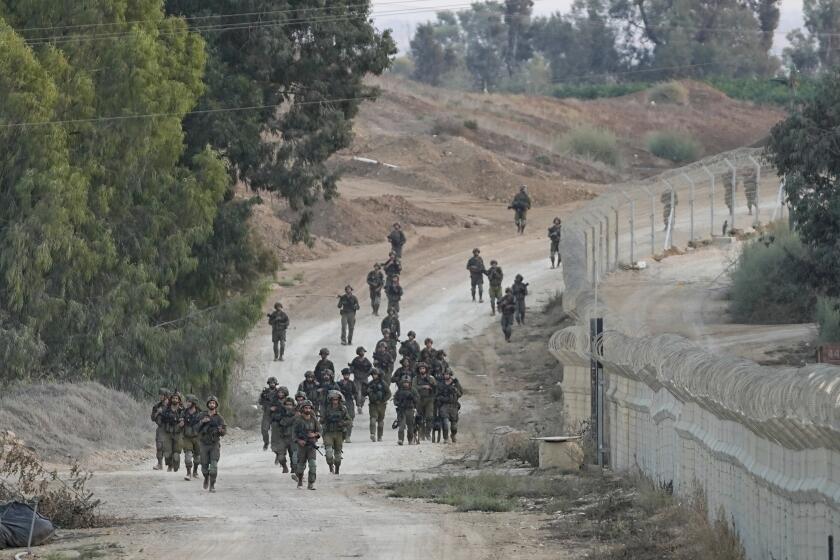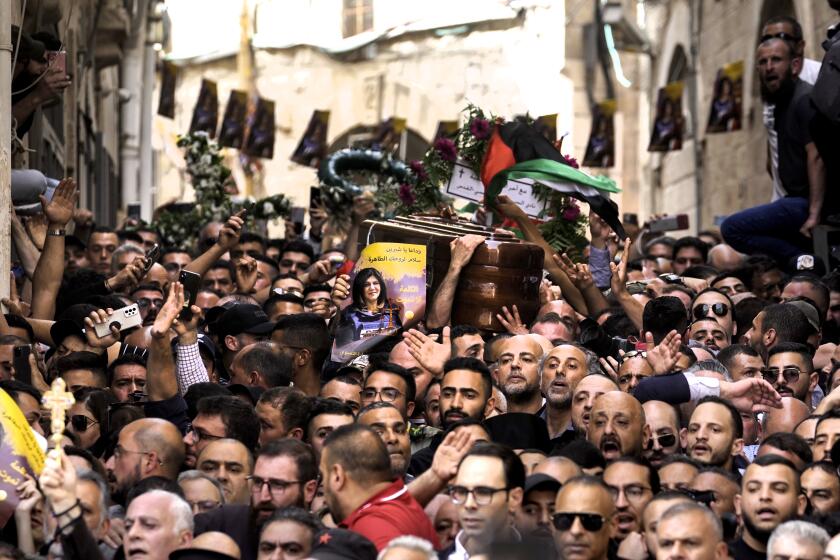Opinion: My whole family is in Gaza and they have nowhere to run. Will it be at their graves that we meet again?
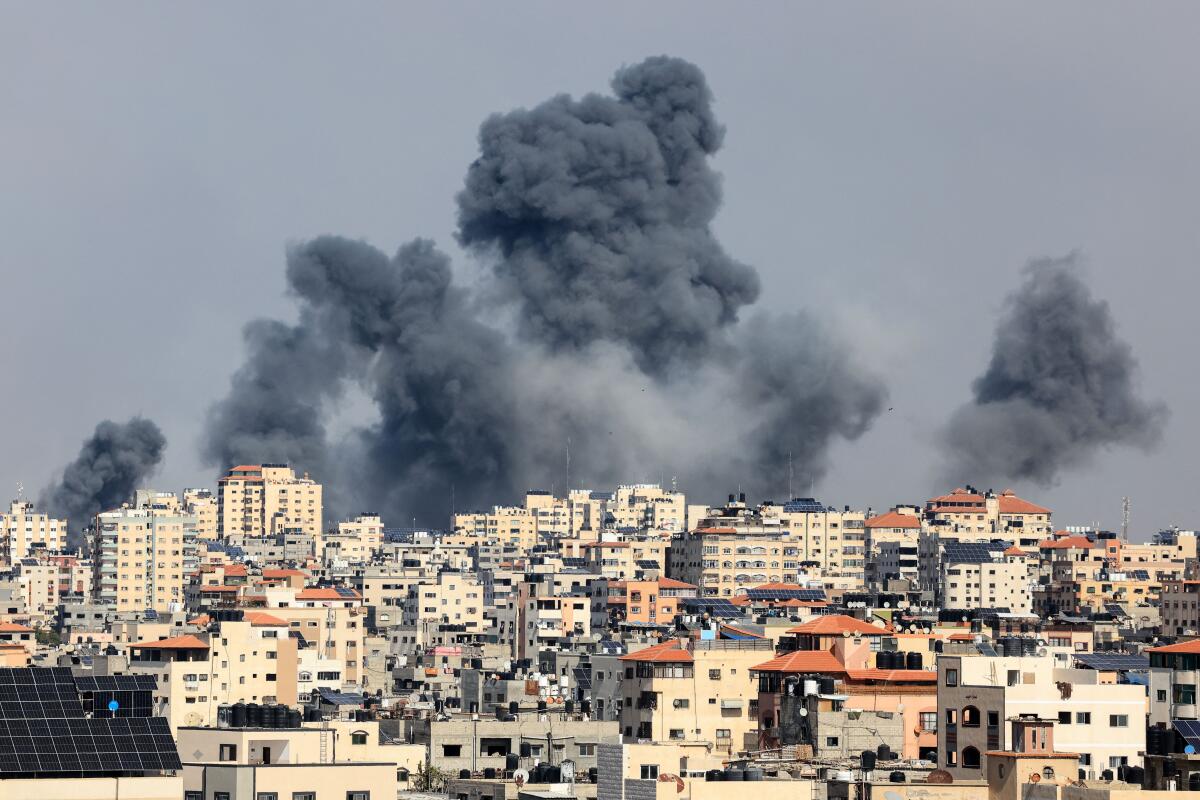
I live in the U.K. My entire family lives in Gaza. In the moments I have been able to reach them, they say to me: âHeaven is much closer to us than the Sinai desert.â
Itâs as if my family is saying: Iâd rather die here and now than end up as a refugee again, and again.
I have heard this sentiment repeatedly from the moment the Israeli government ordered Palestinians in Gaza to move south in the narrow Gaza Strip. No one in Gaza thinks of this order as a precautionary measure to reduce civilian casualties once Israelâs ground invasion commences.
My colleague Ibrahim was killed after the Hamas attacks. Now, Israel is bombing Gaza and blocking food and electricity. Will journalists be able to cover the humanitarian crisis?
Rather, it seems to be the fulfillment of an Israeli strategy to empty Gaza of its people and throw the problem into Egyptâs lap, namely in the Sinai desert.
âI donât want to leave my home, they can bomb it over our heads.â That was my motherâs answer to the order.
Other members of the family thought differently, especially as my 90-year-old grandmother is now staying with them after her house was severely damaged by an Israeli airstrike that hit her neighborâs home.
Will reducing Gaza to rubble actually achieve long-term security for Israel? Are there no other, more effective ways to neutralize Hamas that Israel hasnât yet tried?
To my father, it was a choice between staying and probably getting killed, or going to stay at my sisterâs home in the Nuseirat refugee camp thatâs beyond the line designated by the Israeli army, yet still an area constantly hit by Israelâs airstrikes.
The problem with the second option is that â people believe â once the army has leveled Gaza City, they will move south, pushing people further toward the Egyptian border. After such a point, there will be no return, repeating the 1948 Nakba, when Palestinians were displaced from their homes and Israel was created.
âImagine, your grandmother started her life with the Nakba, and sheâs spending her last days on earth living another one,â my brother said.
The terrorist ambush launched from Gaza reflected an operational failure on the part of the Jewish state: a basic misunderstanding of the nature of the enemy.
âIâm really exhausted and no longer care if I live or die,â he added.
âBut you know, I can live with all this misery, I learned to accept it. But what I cannot fathom; rather, what I am absolutely heartbroken about is all this dehumanization of us. All these fabrications against us.â
âI will never forgive them â not for oppressing and killing us for decades â but for blaming us for the misery they inflicted upon us and, even, for being killed by them.â
âIâm being blamed for getting killed, imagine!â
My brotherâs voice faded, I am assuming, as his phone battery died.
I now know my family managed to reach my sisterâs house.
Right-wing Israeli leaders refuse to meet with Palestinians. But there will be no solution unless Israel recognizes Palestiniansâ national rights.
But I also know the poor communication channels with them will probably disappear over the next few days. That will render me and thousands like me, Palestinians abroad, stranded in a nightmarish scenario of anxiety and uncertainty about the safety of our loved ones.
It is not an exaggeration to say we fear the worst, possibly the unimaginable.
A genocide! There, I said it, and I know it is a big word.
But if the trajectory of the past week points to one thing, it is that Israel is on a rampage against the very people it occupies and besieges.
With all the evils in this conflict, I never thought it would come to this.
Now I feel sick to my stomach just thinking that my people could be ethnically cleansed again, or worse, by the very people whose identity has been built upon the trauma of the Holocaust. Yes, the irony is disturbing!
The cynical part of my brain wants to convince the skeptical one that, surely, this cannot happen. But because I lived under the Israeli governmentâs occupation for half of my life and experienced its treatment of us, I cannot say Iâm too sure.
What is even more cynical is that in the past few days, I spent most of my time âcounselingâ people from inside Gaza on WhatsApp. Most of them I do not know, and most just wanted to chat so they do not feel alone.
They repeatedly asked me if there were any international moves to quell Israel or if Israel was truly planning genocide.
One of them simply said to me: âIf you do not hear from me again, it means Iâm dead. Just keep my messages on your phone, donât delete them. I want to be remembered as someone who once existed.â
Comforting words, that is all I have for them, for Iâm as helpless as they are.
And I cannot help but feel those words are just cowardly, meaningless and achieve nothing for people who feel abandoned by the world and who possess zero means of self-defense.
All I can think about is how trivial everything else feels now, and how insane the whole conflict is.
I cannot shake off the horrifying thought of what might happen to my loved ones in the coming few days.
When am I going to see my family again, if ever? Will it be at their graves, on top of the mountain of rubble that used to be our home, or as displaced people somewhere?
All of that might appear like hot news in a foreign land to you.
But, believe us, we are just like you. We, too, have dreams like everyone else.
We just want to be treated like humans.
To breathe like the rest of the world.
Is that too much to ask?
Emad Moussa is a Palestinian-British researcher and writer specializing in the political psychology of inter-group and conflict dynamics.
More to Read
A cure for the common opinion
Get thought-provoking perspectives with our weekly newsletter.
You may occasionally receive promotional content from the Los Angeles Times.
